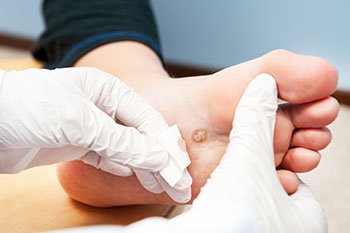Causes and Treatment for Plantar Warts
It is not uncommon for anyone who spends a lot of time at the gym or pool to develop plantar warts, or verrucae, on the bottom of the feet or around the toes. This condition is caused by the human papilloma virus (HPV) – a highly transmissible virus that loves moist, warm environments, such as locker rooms, shower floors, and swimming pool changing areas. The warts usually appear as a cauliflower-shaped growth with small dots. While they are basically harmless, they spread easily. Therefore, it’s a good idea to get rid of them as soon as possible. Because of this, patients who have a painful plantar wart, especially if it won’t go away on its own, would be wise to visit a podiatrist for treatment. Among the many options are removal with acid-based treatments, which are stronger than over-the-counter ointments, cryotherapy (freezing them off with liquid nitrogen), and laser surgery for larger clusters.
Plantar warts can be very uncomfortable. If you need your feet checked, contact Anthony Ricciardi Jr., DPM from Foot & Ankle Specialists of Nevada. Our Doctor will assist you with all of your foot and ankle needs.
About Plantar Warts
Plantar warts are the result of HPV, or human papillomavirus, getting into open wounds on the feet. They are mostly found on the heels or balls of the feet.
While plantar warts are generally harmless, those experiencing excessive pain or those suffering from diabetes or a compromised immune system require immediate medical care. Plantar warts are easily diagnosed, usually through scraping off a bit of rough skin or by getting a biopsy.
Symptoms
- Lesions on the bottom of your feet, usually rough and grainy
- Hard or thick callused spots
- Wart seeds, which are small clotted blood vessels that look like little black spots
- Pain, discomfort, or tenderness of your feet when walking or standing
Treatment
- Freezing
- Electric tool removal
- Laser Treatment
- Topical Creams (prescription only)
- Over-the-counter medications
To help prevent developing plantar warts, avoid walking barefoot over abrasive surfaces that can cause cuts or wounds for HPV to get into. Avoiding direct contact with other warts, as well as not picking or rubbing existing warts, can help prevent the further spread of plantar warts. However, if you think you have developed plantar warts, speak to your podiatrist. He or she can diagnose the warts on your feet and recommend the appropriate treatment options.
If you have any questions please feel free to contact our office located in Las Vegas, Nevada . We offer the newest diagnostic and treatment technologies for all your foot and ankle needs.

